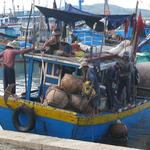Environment, resources and fishers in and out of the South China Sea: understanding the illegal Vietnamese harvest of marine goods in Northern and Northeastern Australia
The article explores Vietnamese fishing activities in and out of the South China Sea. It considers the historical and economic trajectories of fishing communities in the region and the role of Vietnam's subsidies and engagement as a maritime militia in drawing detrimental harvesting and transgressing into other countries' Exclusive Economic Zones (EEZs). Zooming in on northern and northeastern Australia, I apply the concept of 'occupational slippage' to explain a large influx of Vietnamese fishing fleets harvesting giant clams and other marine goods in its EEZ. Firstly, I show that while maritime militia status carries benefits, it requires fishers to fish offshore, thereby serving Vietnam's goal of bolstering its territorial claims in the South China Sea and incentivizing fishers to apply for state subsidies that enable rendering their boats seaworthy for these more dangerous operations. Secondly, I argue that sensitivity to past dynamics and inter-ethnic networks sheds light on how territorial disputes and securitization of maritime borders intensify long-established patterns of maritime livelihoods, extending now to other seas and oceans. By tracing historical legacies through the lens of occupational slippage, I offer a nuanced understanding of Vietnamese fishers' expansions and their shifts between 'legal', 'illegal' and 'licit' activities, beyond the conceptualization of the sea as a zone of conflicts and securitization.
https://doi.org/10.1007/s40152-025-00425-0




